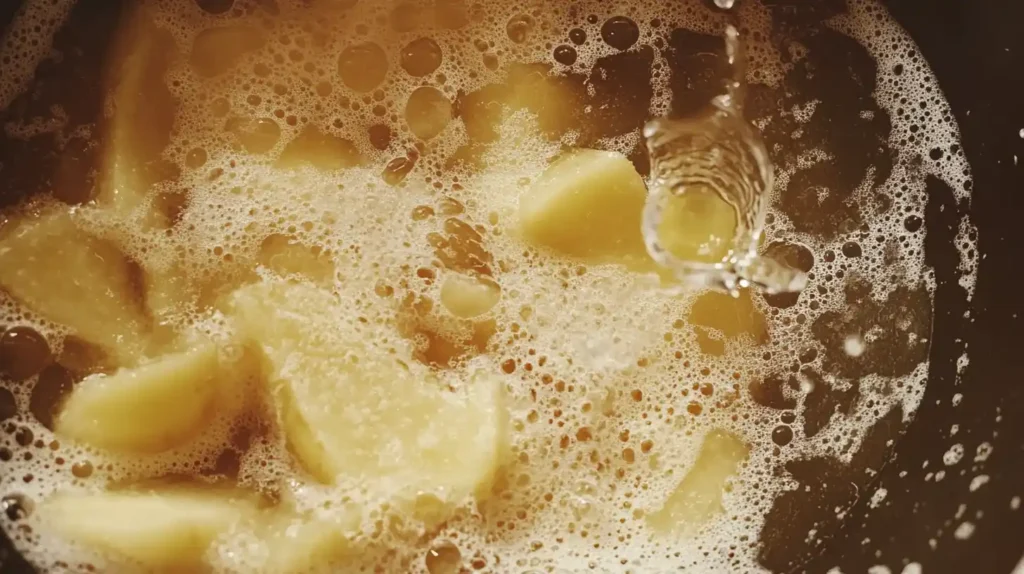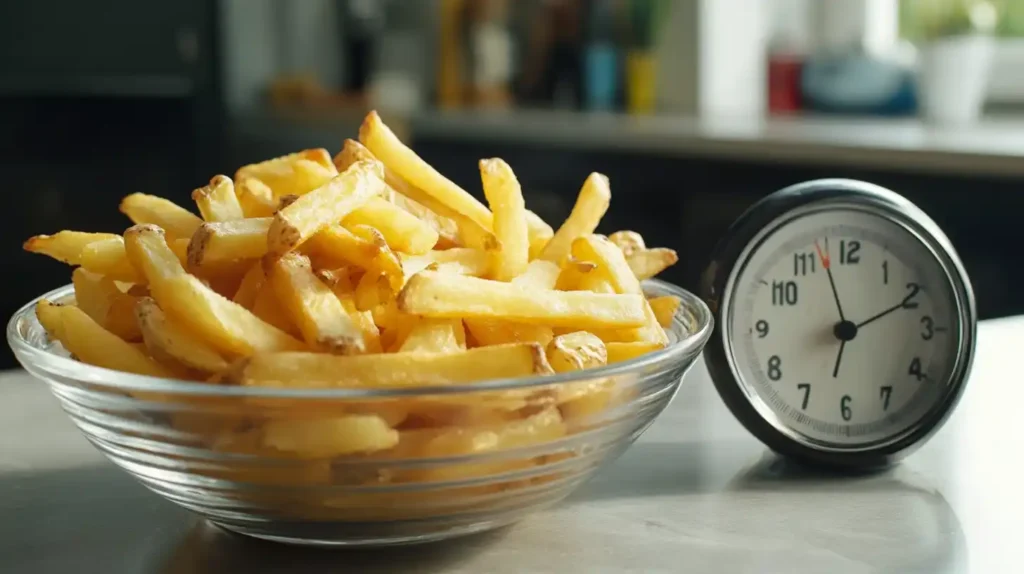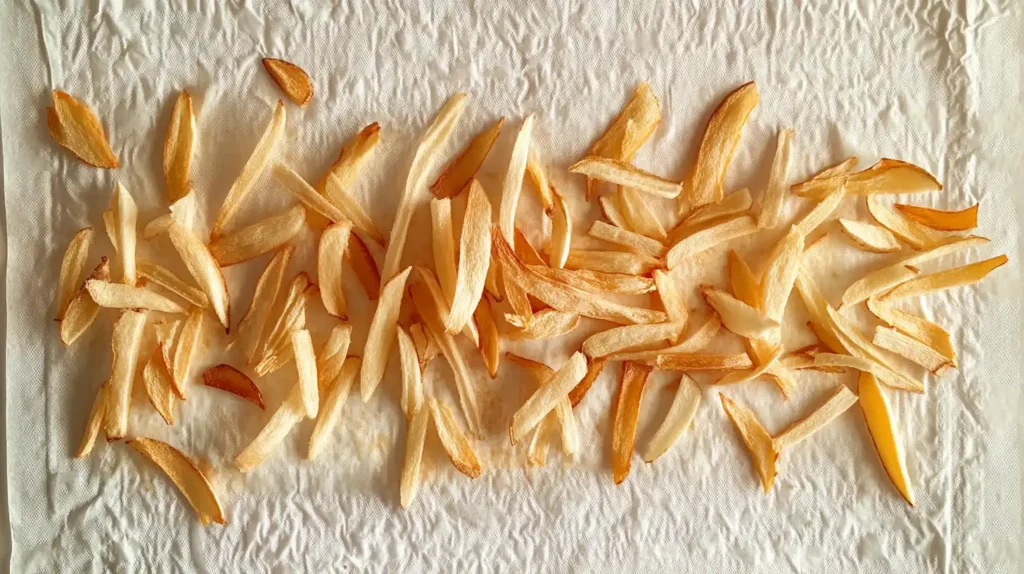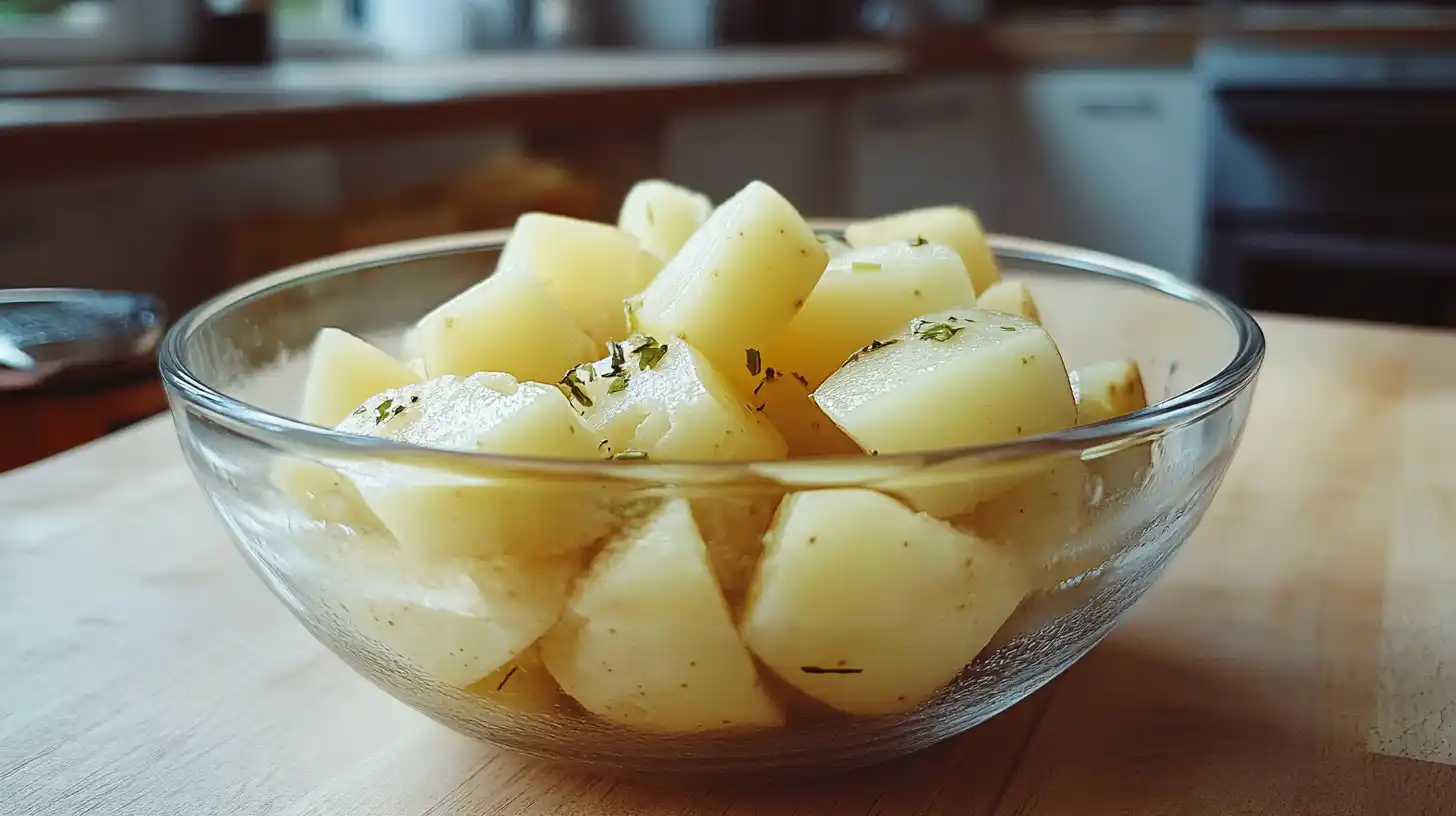The main reason to soak French fries in water before frying is to remove excess starch. When potatoes are cut, they release starch, which can lead to soggy, sticky fries instead of crispy ones.
Here’s why you should always soak French fries in water before frying:
Removes excess starch to prevent sogginess.
Creates a crispy outer layer while keeping the inside soft.
Prevents over-browning and burning.
Reduces oil absorption, making fries less greasy.
Soaking your fries for at least 30 minutes improves their texture and frying quality.
French fries are a favorite side dish worldwide, but have you ever wondered why many chefs recommend that you soak French fries in water before frying? This step might seem unnecessary, but it significantly improves texture, crispiness, and flavor.
If you want perfectly crispy, golden-brown fries, you must soak French fries in water before frying. But why does this simple trick work so well? Let’s break down the science, best soaking methods, and expert frying tips to help you achieve restaurant-quality French fries at home.

1. The Science Behind Soaking French Fries in Water
Soaking French fries before frying is more than just a cooking trick. It has real scientific benefits that affect the taste, texture, and even the healthiness of your fries.
Would you like to continue with this section, or skip to another one? 🚀
1.1 Removing Excess Starch for Crispier Fries
Potatoes have a lot of starch, especially on the surface. This starch can cause fries to become soggy and soft instead of crispy.
How does starch affect French fries?
- When you cut potatoes, the exposed surface releases starch.
- If you don’t remove this starch, fries can become gummy inside.
- Starch also absorbs oil, making fries greasy and heavy.
How does soaking help?
- Water washes away extra starch.
- Fries become crispier and less likely to stick together.
- The outside layer dries better, leading to a perfect crunch.
1.2 Preventing Over-Browning and Burning
Another reason for soaking French fries in water before frying is to prevent over-browning.
Why do some fries turn too dark too fast?
- The natural starch on potatoes turns into sugar when exposed to air.
- When fried, this sugar caramelizes quickly, making fries too dark before they cook inside.
- This leads to fries that are burnt outside but raw in the middle.
How soaking helps
- Soaking slows down this reaction by removing surface starch.
- Fries fry more evenly and turn a nice golden-brown color.
- You get fries that are crispy on the outside and fluffy on the inside.
1.3 Soaking Helps to Make Extra Crispy Fries
If you love crispy fries, then soaking is a must!
What makes fries crispy?
- The key to crispy fries is the right balance of moisture.
- Fries need to be dry on the outside but still have moisture inside.
- Too much starch holds onto water, making fries soft instead of crispy.
How does soaking improve crispiness?
- Washing off starch helps fries dry better before frying.
- It allows the oil to seal the outer layer quickly, locking in the crispiness.
- This creates a crunchy, golden crust while keeping the inside soft and airy.
For another crispy side dish option, check out this What Are Onion Fries Called? guide to explore variations of fried onions that could pair well with your French fries.
2. Cold Water vs. Warm Water: What’s Best for Soaking French Fries?
Now that you know why to soak French fries in water before frying, let’s talk about the best way to do it.
2.1 Soaking French Fries in Cold Water for the Best Results
Most chefs and home cooks recommend cold water soaking.
Why is cold water the best choice?
- It slows down the enzyme activity that makes potatoes turn brown.
- The texture stays firm, so fries don’t become mushy.
- It gives time for the starch to release without breaking down the potato structure.
How long should you soak fries in cold water?
- 30 minutes: Helps remove some starch.
- 1-2 hours: Best balance between crispiness and texture.
- Overnight: Removes even more starch, but fries can become too soft.
2.2 Soaking French Fries in Warm Water: When to Use It
Some chefs prefer warm water soaking, but it has different effects.
Benefits of warm water soaking
- Speeds up the process starch comes off faster.
- Works well if you’re short on time.
- Helps potatoes cook a little before frying, which can create a softer inside.
For a full meal idea, you might want to explore this Irresistible Chili’s Baked Potato Soup Recipe a great companion to crispy fries!
Downsides of warm water soaking
- Fries may become too soft and break easily.
- They might absorb more oil, making them greasier.
3. How Long Should You Soak French Fries in Water Before Frying?
Soak French Fries is an essential step in preparing them properly. Soaking time plays a huge role in how fries turn out. If you soak too little, starch remains; if you soak too long, fries can become too soft.

3.1 Short Soak (15-30 Minutes)
If you’re in a hurry, a quick soak is better than nothing!
- Removes some starch but not all.
- Fries may still be a little starchy but will crisp up slightly.
- Works best for air frying or oven baking.
3.2 Medium Soak (1-2 Hours) – Best for Most Fries
This is the sweet spot!
- Removes most of the excess starch.
- Helps fries get crispy but not too dry.
- Works great for deep-frying and air-frying.
3.3 Overnight Soak (6-12 Hours) – Maximum Starch Removal
Some chefs swear by overnight soaking, but it’s not always the best choice.
- Fries lose almost all surface starch.
- They turn extra light and crispy.
- However, they can become too soft, making them harder to handle.
4. Step-by-Step Guide to Frying French Fries After Soaking
Now that you’ve soaked your fries, it’s time to fry them! But before you drop them into hot oil, you need to follow a few more important steps.
Skipping any of these steps can lead to soggy, greasy, or unevenly cooked fries.
4.1 Choosing the Best Potatoes for French Fries
Not all potatoes make good fries. The type you use affects texture, crispiness, and flavor.
Best potatoes for crispy French fries
- Russet potatoes (also called Idaho potatoes) – Best choice for crispy fries!
- Yukon Gold – Slightly softer inside, good for thicker fries.
- Avoid waxy potatoes like red or new potatoes – They contain too much water and won’t crisp up well.
4.2 Cutting Potatoes for the Perfect Fry Shape
The way you cut your fries affects how they cook.
How to cut French fries evenly
- Use a sharp knife or a fry cutter for even shapes.
- Cut fries ¼ inch thick for classic, crispy fries.
- For thick-cut fries, aim for ½ inch thick.
4.3 Draining and Drying Fries After Soaking
After soaking, fries will be soaking wet. But frying wet fries is a big mistake!
Why drying fries is important
- Water and oil don’t mix – Wet fries will cause oil to splatter!
- Extra moisture prevents crispiness – Damp fries absorb more oil and turn soggy.
Best way to dry soaked fries
- Drain fries in a colander.
- Lay them out on paper towels or a clean kitchen towel.
- Pat them dry until no water is left.

4.4 The Best Oil for Frying French Fries
Not all oils are good for deep-frying. The best oils have a high smoke point, meaning they don’t burn easily.
Best oils for frying crispy French fries
- Peanut oil – Best flavor and high heat tolerance.
- Canola oil – Neutral flavor and widely available.
- Sunflower oil – Great for extra crispiness.
- Avoid olive oil – Burns too quickly at high temperatures.
4.5 Frying French Fries the Right Way (Double-Frying Method)
The secret to crispy fries is double-frying. This means you fry them twice—once at a lower temperature to cook them through, and again at a higher temperature to crisp them up.
First Fry (Blanching)
- Heat oil to 325°F (163°C).
- Fry potatoes for 3–4 minutes, until they turn pale but still soft.
- Remove fries and let them rest on paper towels for at least 10 minutes.
Second Fry (Crisping)
- Heat oil to 375°F (190°C).
- Fry potatoes again for 2–3 minutes, until they turn golden brown.
- Drain fries on paper towels and immediately season with salt.
4.6 Tips for Extra Crispy French Fries
Want to take your fries to the next level? Here are a few extra tricks:
- Add cornstarch – Toss fries in a little cornstarch before frying for an even crispier crust.
- Freeze before frying – Let fries cool completely, then freeze them for 30 minutes before the second fry.
- Use a wire rack – Instead of draining fries on paper towels, let them cool on a wire rack to keep them crispy.
5. Alternative Methods for Crispy Fries (Without Soaking)
While soaking French fries in water before frying is the best way to get crispy results, it’s not the only method. Why soak French fries in water before frying? This process removes excess starch, which helps the fries achieve a more desirable crunch. If you don’t have time to soak your fries, there are other tricks that can help you achieve a perfectly crispy texture.
5.1 Rinsing Instead of Soaking
If you’re short on time, a quick rinse can remove some starch and improve crispiness.
How to rinse potatoes for fries
- Place the cut potatoes in a colander.
- Rinse them under cold running water for about 30–60 seconds.
- Dry them thoroughly before frying.
Pros and Cons of Rinsing vs. Soaking
✅ Pros: Saves time, removes some starch.
❌ Cons: Doesn’t remove as much starch as soaking, fries may still turn soft.
5.2 Parboiling (Boiling Before Frying)
Instead of soaking, some chefs parboil their fries this means boiling them briefly before frying.
How to parboil French fries
- Bring a pot of water to a boil.
- Add cut potatoes and boil for 2–3 minutes.
- Drain the potatoes and let them cool completely before frying.
Why parboiling works
- It helps fries cook evenly inside before frying.
- It removes more starch than rinsing.
- It gives fries a light, crispy exterior with a fluffy inside.
5.3 Using Cornstarch or Flour for Extra Crispiness
A simple trick to make crispy fries without soaking is to coat them in cornstarch or flour before frying.
How to use cornstarch for crispy fries
- Cut and dry your potatoes.
- Lightly sprinkle them with cornstarch or flour.
- Toss them to coat evenly before frying.
Why this works
- The cornstarch creates a thin, crispy coating.
- It absorbs extra moisture, preventing soggy fries.
- It works especially well for air-fried or baked fries.
5.4 Freezing Fries Before Frying
Freezing raw fries before cooking can help remove moisture and make them extra crispy.
How to freeze fries for better crispiness
- Cut and dry the potatoes.
- Spread them out on a baking sheet.
- Freeze for 30–60 minutes before frying.
Why freezing works
- It removes extra water.
- It helps fries keep their shape and texture.
- It creates a stronger crust during frying.
6. Health Benefits of Soaking Potatoes Before Frying
Soaking French fries in water before frying doesn’t just improve texture it also has health benefits. Many people don’t realize that soaking helps reduce harmful chemicals and makes fries slightly healthier.
6.1 Reducing Acrylamide Formation in Fried Potatoes
Fried foods have been under scrutiny due to several health concerns. When starchy foods are cooked at high temperatures, a chemical called acrylamide is formed, which is considered one of the biggest risks associated with these foods.
Why is acrylamide a concern?
- It forms naturally when potatoes, bread, or other starches are fried or baked.
- High acrylamide levels have been linked to health risks, including potential carcinogenic effects.
How does soaking help?
- Soaking potatoes for at least 30 minutes reduces acrylamide levels by up to 38%.
- The longer the soak, the more acrylamide is washed out before frying.
- This makes your fries slightly healthier while keeping them crispy and tasty.
6.2 Lowering Oil Absorption for Healthier Fries
Many people love French fries, but they don’t love the grease. The good news is, soaking potatoes before frying can reduce oil absorption.
How does soaking help reduce oil?
- Removing starch helps the outer layer of the fries dry properly.
- When fries are dry, they absorb less oil during frying.
- Less oil means fewer calories and less fat in your fries.
How to maximize this effect
- Soak for at least 1 hour for the best results.
- Pat fries completely dry before frying to prevent oil absorption.
- Use high-heat frying (at least 375°F/190°C) to create a quick, crispy seal.
6.3 Improving Digestibility of Fried Potatoes
If you’ve ever felt bloated or heavy after eating fries, excess starch might be the reason.
How does soaking improve digestion?
- Starch is harder for some people to digest, especially in large amounts.
- Soaking helps break down excess starch, making fries easier on the stomach.
- This can be especially helpful for people with sensitive digestion or those trying to avoid blood sugar spikes.
6.4 Preventing Fries from Sticking Together
While this isn’t exactly a health benefit, it does help prevent frustration when cooking.
Why do fries stick together?
- Unsoaked fries have too much starch on the surface.
- When they hit hot oil, this starch gels together, causing fries to clump.
How soaking solves this problem
- Removing starch keeps fries separate, so they cook evenly.
- This means less oil absorption, which contributes to healthier, crispier fries.
7. Frequently Asked Questions (FAQs) About Soaking French Fries
Many people have questions about soaking French fries in water before frying. Here, we answer the most common FAQs to help you make the best fries at home!
7.1 What Happens If I Don’t Soak My Fries?
If you skip soaking, your fries may not turn out as crispy and golden as you expect.
Effects of not soaking fries:
Fries may become soggy and soft instead of crispy.
They can turn too dark too fast due to excess starch caramelizing.
Fries might stick together in the oil.
They may absorb more oil, making them greasier.
Soaking helps prevent all of these problems. Even a short 30-minute soak makes a big difference!
7.2 Can I Soak Fries for Too Long?
Yes! While soaking is great, leaving fries in water for too long can make them too soft.
What happens if you soak fries too long?
- After 12+ hours, potatoes start to break down and lose structure.
- Over-soaked fries may become mushy inside instead of fluffy.
- They might absorb too much water, leading to less crispiness after frying.
What’s the best soaking time?
- 30 minutes to 2 hours: Best balance between starch removal and crispiness.
- Overnight (6–12 hours): Works, but can lead to slightly softer fries.
- More than 24 hours: Not recommended—potatoes may develop an off taste.
7.3 Does Soaking Potatoes Affect Their Flavor?
No, soaking does not change the natural flavor of potatoes. Instead, it improves their texture and frying quality.
What does soaking do to flavor?
- It removes bitterness from certain potatoes.
- Fries taste more balanced because they don’t brown too quickly.
- The frying process brings out natural sweetness when starch is properly reduced.
7.4 Do I Have to Dry Fries After Soaking?
Yes! Drying fries after soaking is crucial for crispy results.
Why is drying important?
- Water and hot oil don’t mix—wet fries will cause dangerous oil splatter.
- Wet fries steam instead of crisping, leading to soggy fries.
- Dry fries cook evenly, resulting in a golden, crunchy texture.
How to properly dry fries:
- Drain fries well after soaking.
- Spread them on paper towels and pat them dry.
- Let them air dry for 10–15 minutes before frying.
7.5 Can I Store Pre-Soaked Fries for Later?
Yes, but only for a short time.
How to store soaked fries:
- Keep them in a bowl of cold water in the fridge.
- Change the water every 6–8 hours to prevent discoloration.
- Use them within 24 hours for the best results.
⚠️ Don’t leave soaked fries too long! After a day, potatoes may become waterlogged and lose their crispy potential.
7.6 Does Soaking Help If I’m Air Frying Fries?
Yes! Even if you’re air frying instead of deep frying, soaking can help.
How soaking improves air-fried fries:
Removes starch, leading to better browning.
Helps fries get crispier, even with less oil.
Prevents burnt edges and undercooked centers.
Best soaking method for air-fried fries:
- Soak for 1–2 hours for best texture.
- Dry fries completely before air frying.
- Use a light oil spray to help crisp them up.
7.7 Can I Use Vinegar or Salt in the Soaking Water?
Some people add vinegar or salt to their soaking water for extra benefits.
Effects of adding vinegar to soaking water:
- Helps preserve the texture of potatoes.
- Makes fries less likely to fall apart during frying.
- Works well for thicker-cut fries like steak fries.
Effects of adding salt to soaking water:
- Can make fries softer instead of crispier.
- Draws out moisture, which might lead to mushy fries.
- It’s better to add salt after frying for the best taste.
Conclusion: Why You Should Soak French Fries in Water Before Frying?
Soaking French fries in water before frying is the key to making crispy, golden, and delicious fries. It removes excess starch, prevents over-browning, reduces oil absorption, and makes fries lighter and crunchier.
Quick Recap for Perfect Fries
Soak in cold water for 30 minutes to 2 hours.
Pat fries completely dry before frying.
Double-fry for the crispiest texture (325°F first, then 375°F).
Season immediately after frying for the best flavor.
A little extra time makes all the difference so don’t skip soaking! Enjoy your perfect homemade fries! 🍟🔥

